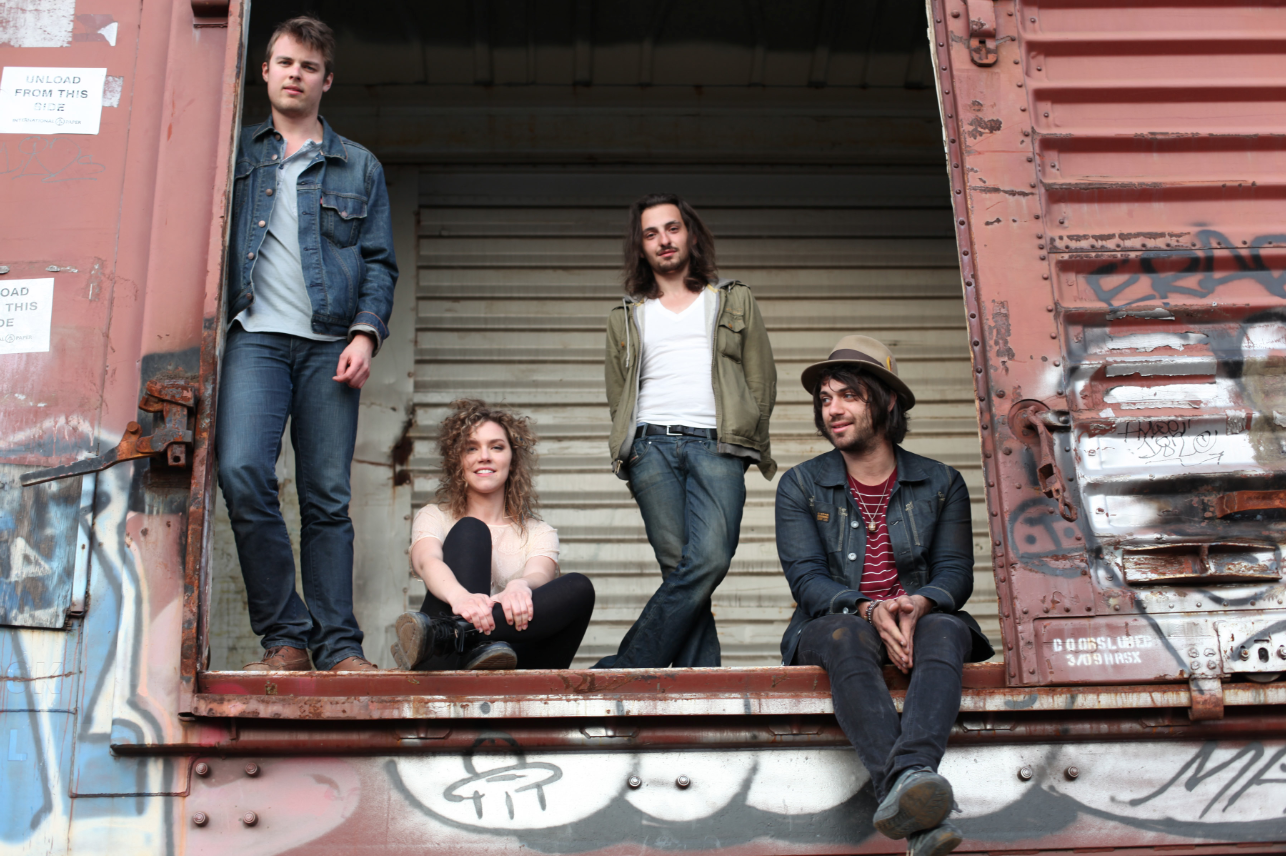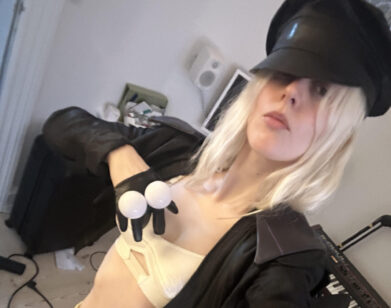Genevieve and the Company She Keeps

GENEVIEVE SCHATZ (SECOND FROM LEFT) AND HER BAND, COMPANY OF THIEVES.
Running from a Gamble means many different things to Genevieve Schatz—some of which she can’t say aloud. After eight line-up changes, Chicago native Schatz’s band, Company of Thieves, is standing strong as a musical family. Their sophomore debut came out full-force with a rawer version of the band’s energetic and eclectic sound. For Schatz, producing this album meant a discovery of identity and the journey of growing up.
Company of Thieves, self-described as a “mixed bag of nuts,” combines genres seamlessly, blending pop, rock, and Motown influences. And from her earliest days singing (she says she came to love it watching The Wizard of Oz‘s Dorothy), to her present-day near-religious experiences in concert, Schatz undoubtedly beats to the sound of her own drummer. She took some time out to talk to us about her new record, her traumatic experiences, and the diverse range of ladies to whom she’s been compared.
ILANA KAPLAN: What was your inspiration for your new record?
GENEVIEVE SCHATZ: Oh, you know… life. And the wild, wild ride that is such. This record was a really healthy, confrontational project for me personally. It deals with the adventures from being young and dependent on my parents and in that transition into independence and somewhat of an autonomous lifestyle that I found myself in.
KAPLAN: Why do you say “confrontational?”
SCHATZ: I think because there’s this little thing in me that just wants to burst. For a lot of my life, I didn’t necessarily express my feelings and my thoughts about things that were going on around me. I’m confronting a lot of issues that I found myself going through the past two years of my life; issues from being ostracized about being myself from talking about how to deal with things, to questioning all forms of authority in my life that I’ve ever known. I was questioning myself deeply, going inwards and figuring out why there is this search for someone else to conduct your life. I was figuring out identity and purpose while in this country that is so wonderfully free, in the sense that I am not physically threatened right now and I’m sitting on the front stoop of my apartment, but still psychologically caged in all of the conditioning. Do you know what I mean?
KAPLAN: I know what you mean. That’s a very deep answer. You can see it reflected in your lyrics.
SCHATZ: Thank you. There’s just some crazy shit going on sometimes.
KAPLAN: When you perform, you have this stage presence. It’s your whole body that’s really performing. You’re not just singing. Your entire body is full of music.
SCHATZ: It’s funny you say that. I have these experiences where I will almost forget entire portions of a show because I’m so possessed or something. I’ll get offstage and completely forget about a certain song that we played because I was so way in it. It’s everything. I’m all there.
KAPLAN: You’re often compared to Hayley Williams of Paramore. Do you see a comparison?
SCHATZ: I see that we are both young women who front bands that play rock music, but that’s really it. I think it’s hard. A lot of people don’t have more than a handful of women that are in the forefront or the mainstream that they can easily pull from to make a comparison. I’ve gotten everything from, “you sound like Avril Lavigne,” to “you sound like Bjork,” to people who couldn’t be any more different than each other.
KAPLAN: Your songs tend to tell stories—”The Fire Song” was about your house burning down in Chicago. Are a lot of your songs based on personal anecdotes?
SCHATZ: My songs are without a doubt autobiographical. They will be told sometimes through me and sometimes through a character or a perspective that I’ve taken. “The Fire Song” was definitely first person, and it was a time in my life when I was in eighth grade. It was after school; I was there very late. I was playing a volleyball game, and my neighbor came running in, screaming at the top of his lungs, “Genevieve, I need to take you home. Your house is on fire.” It was just one of those moments where it was an out-of-body experience. You didn’t want to be embarrassed in front of the other kids, and you also didn’t want to act like it wasn’t a big deal.
He and his mom drove me to his house. We pulled up, and my stepmom was sitting on the front lawn just hauled over tugging so hard at the grass, screaming her eyes out. Behind her was this house completely in red flames. It was like half of the town was just standing outside watching it burn. It was really difficult and eye-opening for me, because I come from a very broken home and a very dysfunctional family growing up. This whole thing was physically representing what was happening emotionally and mentally in my household. It was totally burning down the past and burning down these horrible memories. That was the first time I started running away from home. When that happened, my family stayed in a hotel for a while, and I just went to my friend’s house down the street. I started spending weeks and weeks at a time at friends’ houses. It was liberating and horribly sad at the same time. It’s something that really helped me in my life.
KAPLAN: What are your favorite tracks from Running from a Gamble and why?
SCHATZ: Let’s see… I really, really like “Look Both Ways” because it was fun to put myself in the character of the prototype of a sheltered suburban girl who just so badly wants to escape to the big city life and charms her way into getting out. That was fun. I really like “Tallulah,” because we got to have horn players and backup singers. I got to write the backup vocal lines. It was a huge production, like a Motown-soul song, but with our own twist on it. It was cool because it’s a contract between this upbeat, grooving music with lyrics about Tallulah, Louisiana, New Orleans and everything after (Hurricane) Katrina. It’s like, in death there is life. There is not one without the other. It’s this celebration. “It Won’t Go Quietly” is my favorite because I was just confronting all fears of abandonment, and it just felt good.
KAPLAN: Why did you choose Running from a Gamble as a title for the new album?
SCHATZ: There are so many reasons, and there are some that I can’t tell you for legal reasons. [laughs]
KAPLAN: I feel like there’s an interesting story there.
SCHATZ: There are some that I can say, which are, there is this feeling that I get being a young, American girl living the American dream, and it is the fact that no one said that it’s not possible to make your dreams come true. No one said it was going to be easy, either. I feel like everyone along the way makes it really hard, and there’s this reality of taking all of these risks to just do what you love in life. They’re gambles, and you never know what’s going to happen. It’s not necessarily running away from a gamble. It’s running from a gamble to another gamble where nothing is guaranteed, and you’re constantly at the fork in the road, taking another risk. The chance of you getting to wake up every day and be here on this planet doing what you love is something that just would keep most anyone running.
COMPANY OF THIEVES WILL PLAY WITH LOCKSLEY AND EYTAN & THE EMBASSY AT BOWERY BALLROOM ON JUNE 13. RUNNING FROM A GAMBLE IS OUT NOW. FOR MORE INFORMATION, VISIT THEIR MYSPACE.






